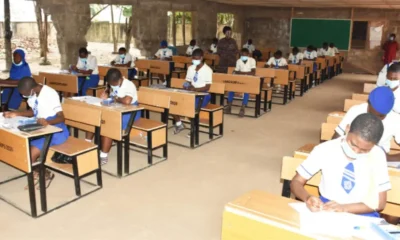Politics
Bangladesh awaits interim government, may include Nobel laureate Yunus
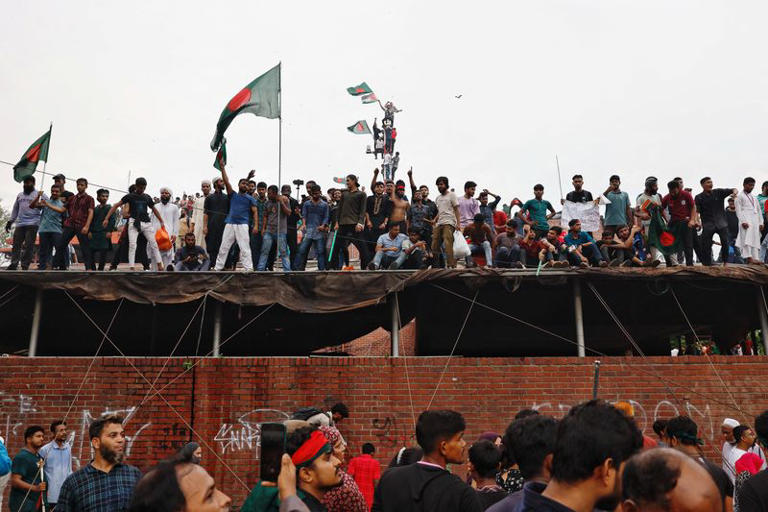
By Ruma Paul
DHAKA (Reuters) -Bangladesh’s army chief will meet student protest leaders on Tuesday as the country awaits the formation of a new government a day after Prime Minister Sheikh Hasina resigned and fled following a violent uprising against her.
Traffic was lighter than usual in the usually chaotic streets of Dhaka and schools reopened with thin attendance after closing down in mid-July as protests against quotas in government jobs spiralled. About 300 people were killed and thousands injured in violence that ripped through the country.
Garment factories, which supply apparel to some of world’s top brands and are a mainstay of the economy, will remain closed on Tuesday and plans to reopen will be announced later, the main garment manufacturers association said.
Student leaders, who spearheaded the anti-quota movement that turned into a call for Hasina to resign, said early on Tuesday Nobel Peace laureate Muhammad Yunus as the chief adviser to the interim government.
“Any government other than the one we recommended would not be accepted,” Nahid Islam, one of the key organisers of the student movement, said in a video on Facebook with three other organisers. “We wouldn’t accept any army-supported or army-led government.”
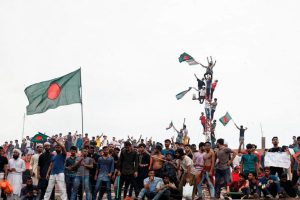
People waves Bangladeshi flags on top the Ganabhaban, the Prime Minister’s residence, as they celebrate the resignation of PM Sheikh Hasina in Dhaka, Bangladesh, August 5, 2024. REUTERS/Mohammad Ponir Hossain
© Thomson Reuters
“We have also had discussions with Muhammad Yunus and he has agreed to take on this responsibility at our invitation,” Islam added.
Yunus, 84, and his Grameen Bank won the 2006 Nobel Peace prize for work to lift millions out of poverty by granting tiny loans of under $100 to the rural poor of Bangladesh but he was indicted by a court in June on charges of embezzlement that he denied.
Reports said Yunus is currently in Paris and he did not immediately respond to a request for comment from Reuters. He told Indian broadcaster Times Now in a recorded interview that Monday marked the “second liberation day” for Bangladesh after its 1971 war of independence from Pakistan.
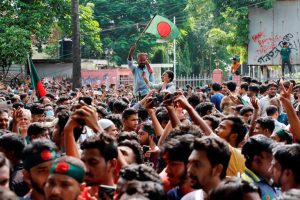
People celebrate the resignation of Prime Minister Sheikh Hasina in Dhaka, Bangladesh, August 5, 2024. REUTERS/Mohammad Ponir Hossain
© Thomson Reuters
But he said Bangladeshis were angry with neighbour India for allowing Hasina to land there after fleeing Dhaka.
“India is our best friend…people are angry at India because you are supporting the person who destroyed our lives,” Yunus said.
Hasina landed at a military airfield at Hindon near Delhi on Monday after leaving Dhaka, two Indian government officials told Reuters, adding that India’s National Security Adviser Ajit Doval met her there. They did not elaborate on her stay or plans.
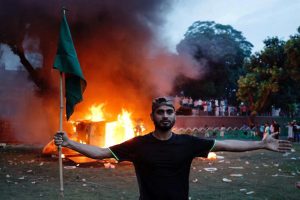
A man holding a Bangladesh flag stands in front of a vehicle that was set on fire at the Ganabhaban, the Prime Minister’s residence, after the resignation of PM Sheikh Hasina in Dhaka, Bangladesh, August 5, 2024. REUTERS/Mohammad Ponir Hossain
© Thomson Reuters
India’s Foreign Minister Subrahmanyam Jaishankar addressed a closed door all-party meeting in parliament on Tuesday morning about the crisis in Bangladesh. No details were immediately available.
FRESH ELECTIONS PLANNED
Bangladesh army chief General Waker-Uz-Zaman plans to meet the protest organisers at 12 noon local time (0600 GMT) on Tuesday, the army said in a statement, a day after Zaman announced Hasina’s resignation in a televised address and said an interim government would be formed.
Jubilant crowds stormed unopposed into the opulent grounds of Hasina’s residence after she fled, carrying out looted furniture and TVs. One man balanced a red velvet, gilt-edged chair on his head. Another held an armful of vases.
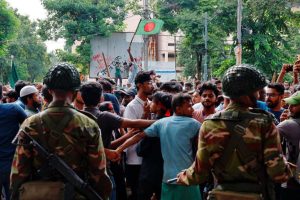
People celebrate the resignation of Prime Minister Sheikh Hasina in Dhaka, Bangladesh, August 5, 2024. REUTERS/Mohammad Ponir Hossain
© Thomson Reuters
“I call upon the people of Bangladesh to display restraint and calm in the midst of this transitional moment on our democratic path,” Tarique Rahman, the exiled acting chief of the opposition Bangladesh Nationalist Party (BNP), said in a post on X on Tuesday.
“It would defeat the spirit of the revolution…if people decide to take the law into their own hands without due process,” he added.
Army Chief Zaman said he had held talks with leaders of major political parties – excluding Hasina’s long-ruling Awami League – to discuss the way ahead and was due to hold talks with the president, Mohammed Shahabuddin.
An interim government will hold elections as soon as possible after consulting all parties and stakeholders, President Shahabuddin said in a televised address late on Monday.
He also said that it was “unanimously decided” to immediately release BNP chairperson and Hasina’s nemesis, Begum Khaleda Zia, who was convicted and jailed in a graft case in 2018 but moved to a hospital a year later as her health deteriorated. Zia, 78, is BNP acting chief Rahman’s mother and she has denied the charges against her.
A BNP spokesperson said on Monday that Zia was in hospital and “will clear all charges legally and come out soon”.
Hasina, 76, had ruled since winning a decades-long power struggle with Zia in 2009.
The Indian Express newspaper reported that Hasina was taken to a “safe house” after her arrival at Hindon and she was likely to travel to the United Kingdom. Reuters could not immediately verify the report.
(Reporting by Ruma Paul in Dhaka, Sudipto Ganguly in Mumbai and Kanjyik Ghosh in Bengaluru; Writing by Shivam Patel; Editing by Raju Gopalakrishnan)
Politics
Breaking: Diri Orders Autopsy on Bayelsa Deputy Governor’s Death, Warns Against Politicisation
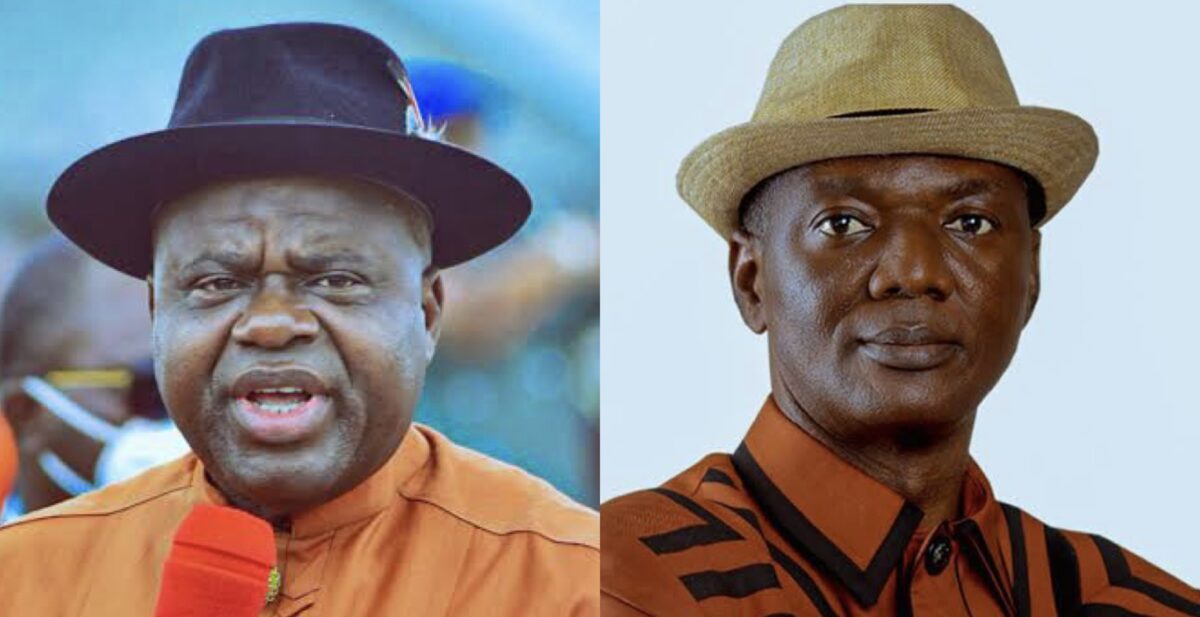
Bayelsa State Governor, Senator Douye Diri, has ordered an autopsy to determine the cause of death of the state’s Deputy Governor, Lawrence Ewhrudjakpo.
Governor Diri gave the directive on Saturday while receiving former President Goodluck Jonathan at the Government House in Yenagoa.
Reacting to the incident, the governor condemned what he described as widespread misinformation and speculation on social media, warning against any attempt to politicise the deputy governor’s death.
“I want to make an appeal. I have seen people politicise his death. In Ijaw land, there is no enmity in death. Let nobody politicise the passing of our dearly beloved deputy governor,” Diri said.
“If anyone truly loves him, this is the time to show it. I have directed that an autopsy be carried out to reveal the cause of his death. There is a lot of nonsense going on on social media.”
The governor further urged the public to focus on mourning and honouring the late deputy governor, noting that the state government had declared three working days of mourning in his honour.
“If anyone is issuing statements to eulogise him, let it end there. Let us mourn him because Bayelsa State is in a mourning mood,” he added.
Governor Diri also called for unity and love among the people, reminding them of the inevitability of death.
Speaking during the condolence visit, former President Goodluck Jonathan described the late Ewhrudjakpo as a committed and dedicated individual who played a key role in the activities of his foundation.
“For me, he was someone my foundation and I will never forget. He represented the governor in all our programs,” Jonathan said, adding that Ewhrudjakpo worked tirelessly in that role, even more than when he served as deputy governor.
Politics
N1.4 Trillion not enough to get me into politics – Bishop Oyedepo reveals
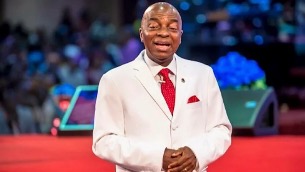
The founder of Living Faith Church, Bishop David Oyedepo, has said he will never take part in partisan politics, not for even billions of naira.
He stated that no amount of money, including “$1 billion,” (1.4 Trillion naira) would make him join politics.
Oyedepo made this known during an impartation service at Shiloh 2025 held at the church’s headquarters in Canaanland, Ota, Ogun State.
He explained that partisan politics is not part of his life’s calling and that is why he has chosen to stay away from it.
In his words: “In 2015, I warned the church that trouble was coming. Didn’t trouble come?
“Partisan politics is off my calling. If you give me $1 billion to join politics, I won’t, because it is off my course.”
The bishop also said the world is in urgent need of God’s intervention because of the times we are living in.
According to him, believers are being trained as an end-time army to bring solutions to national and global problems, similar to what biblical figures like Joseph and Daniel did.
EVENTS
Wike at 58: “You’re a Shinning Star in my Cabinet, Tinubu hails Wike.
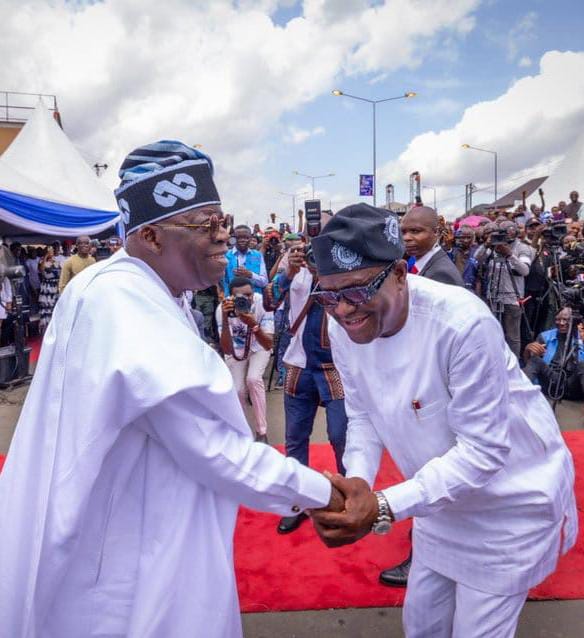
President Bola Tinubu congratulates Chief Nyesom Wike, Minister of the Federal Capital Territory (FCT), on his birthday, December 13.
President Tinubu celebrates with the Minister and former governor of Rivers State, giving thanks to God Almighty for enriching him with a life defined by purpose, service, and courage.
The President describes Chief Wike as an audacious top performer who defies obstacles and delivers results.
President Tinubu acknowledges the ongoing transformation of the Federal Capital Territory through infrastructure expansion, highlighting the Minister’s recent intervention that broke the 14-year logjam in the construction of the Apo-Karshi road.
The President commends Chief Wike for his resilience, can-do attitude, and commitment to excellence in all assignments.
President Tinubu thanks the Minister for his consistent efforts in delivering results and wishes him a happy birthday and strength to further his good work in the FCT.
“Nyesom Wike has been one of the shining stars in the cabinet, an exceptional performer, developing infrastructure in the Federal capital as never seen before and proving that his moniker as ‘Mr Project’ is not limited to his home state of Rivers.
“I commend him for being one of the champions of our Renewed Hope Agenda, even though he belongs to another party and wish him well as he marks another year in his life journey”.
Bayo Onanuga
Special Adviser to the President
(Information and Strategy)
December 13, 2025
-
Business1 year ago
US court acquits Air Peace boss, slams Mayfield $4000 fine
-

 Trending1 year ago
Trending1 year agoNYA demands release of ‘abducted’ Imo chairman, preaches good governance
-

 Politics1 year ago
Politics1 year agoMexico’s new president causes concern just weeks before the US elections
-

 Politics1 year ago
Politics1 year agoPutin invites 20 world leaders
-

 Politics1 year ago
Politics1 year agoRussia bans imports of agro-products from Kazakhstan after refusal to join BRICS
-
Entertainment1 year ago
Bobrisky falls ill in police custody, rushed to hospital
-
Entertainment1 year ago
Bobrisky transferred from Immigration to FCID, spends night behind bars
-
Education1 year ago
GOVERNOR FUBARA APPOINTS COUNCIL MEMBERS FOR KEN SARO-WIWA POLYTECHNIC BORI

